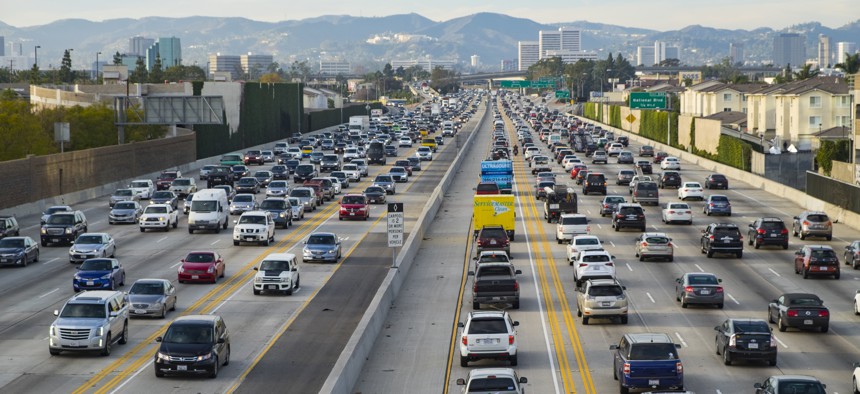EPA Moves to Restore State Authority Over Auto Emissions

iStock.com/jjwithers
Federal regulators are seeking to undo a Trump administration policy aimed at limiting California’s sway over tailpipe standards.
The U.S. Environmental Protection Agency indicated on Monday that it is moving to reverse Trump-era restrictions on the authority California and other states have to adopt tailpipe emissions standards that are more stringent than federal guidelines.
In 2019, under the Trump administration, federal regulators revoked key parts of a waiver granted during the Obama years that enabled California to adopt its own emissions standards for cars and light-duty trucks. EPA said it is now seeking input on the 2019 rule for the purpose of rescinding it. If the rule is scrapped, it would shift more regulatory power back toward states.
California is the only state to receive such a waiver. But other states can implement standards in line with California’s and over a dozen states have done so. The framework gives California a great deal of clout setting standards for automakers reluctant to make different versions of their vehicles to meet federal and state standards.
Monday’s announcement comes as President Biden pushes a slate of policies to curb carbon emissions, with the hope of combating climate change. This marks a sharp departure from the Trump administration’s agenda, which focused more heavily on prioritizing fossil fuel production and cutting red tape.
“I am a firm believer in California’s long-standing statutory authority to lead. The 2019 decision to revoke the state’s waiver to enforce its greenhouse gas pollution standards for cars and trucks was legally dubious and an attack on the public’s health and wellbeing,” EPA Administrator Michael S. Regan said in a statement.
Regan said Monday’s action marked “a major step forward to restore state leadership and advance EPA’s greenhouse gas pollution reduction goals.”
California Gov. Gavin Newsom said EPA’s announcement “begins the process of restoring this critically important tool to allow California, and the numerous states that have adopted our programs, to usher in the new age of [electric vehicles] and zero-emission vehicles.”
Environmental groups applauded the move by EPA.
“The Biden administration’s regranting of the Clean Air Act waiver reverses one of Donald Trump’s most egregious attacks on our nation’s climate policy and returns states’ authority to move forward with clean car programs,” said Sierra Club president Ramón Cruz.
At least 13 other states and the District of Columbia have adopted California’s stricter tailpipe standards. And several others, including Virginia, Minnesota and Nevada, are headed that direction.
The Trump administration rule to curb California’s ability to set emissions standards was issued jointly by EPA and the Transportation Department. DOT said last week it was proposing to withdraw its portions of the rule.
DOT said that its proposal “would establish a clean slate, enabling the Department to further the Administration’s important fuel economy, equity, and climate change priorities—which include reversing unnecessary and potentially unlawful efforts to prevent state action.”
Republicans chafed over the Biden administration’s moves to roll back the rule and give states more control over the standards.
“By allowing California to set stricter-than-federal emissions standards, President Biden is once again prioritizing a rush-to-green environmental agenda over the needs and well-being of hardworking American families,” said U.S. Rep. Cathy McMorris Rodgers, of Washington, the top Republican on the House Energy and Commerce Committee.
Rodgers and other critics of the Biden administration’s approach say that it will result in a patchwork of policies, rather than uniform national standards, and that it will drive up the cost of new vehicles for consumers, forcing them to keep their older, less-safe cars longer.
The Alliance for Automotive Innovation, which represents major automakers, has emphasized that the industry is aligned with Biden’s goals to reduce vehicle emissions and shift toward electric vehicles. But the group also says it wants to work toward a “revised national program that includes California" and "brings all automakers under a unified set of common requirements.”
Bill Lucia is a senior editor for Route Fifty and is based in Olympia, Washington.
NEXT STORY: Joint advisory warns of Russian operations targeting cloud, email






